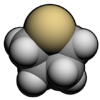Tetrahydrothiophene
| |||
| Names | |||
|---|---|---|---|
| IUPAC name
Thiolane | |||
| Other names
Tetrahydrothiophene, thiophane, tetramethylene sulfide | |||
| Identifiers | |||
| Abbreviations | THT | ||
| 110-01-0 | |||
| ChEBI | CHEBI:48458 | ||
| ChEMBL | ChEMBL1379 | ||
| ChemSpider | 1095 | ||
| |||
| Jmol-3D images | Image | ||
| |||
| Properties | |||
| Molecular formula |
C4H8S | ||
| Molar mass | 88.17 g·mol−1 | ||
| Density | 0.999 g/mL[1] | ||
| Melting point | −96 °C (−141 °F; 177 K) | ||
| Boiling point | 119 °C (246 °F; 392 K) | ||
| Except where noted otherwise, data is given for materials in their standard state (at 25 °C (77 °F), 100 kPa) | |||
| | |||
| Infobox references | |||
Tetrahydrothiophene is an organosulfur compound with the formula (CH2)4S. It consists of a five-membered ring containing four carbon atoms and a sulfur atom. It is the saturated analog of thiophene. It is a volatile, colorless liquid with an intensely unpleasant odor. It is also known as thiophane, thiolane or THT.
Synthesis and reactions
It is prepared by the reaction of tetrahydrofuran with hydrogen sulfide. This vapor-phase reaction is catalyzed by alumina and other heterogenous acid catalysts.[2][3]
This compound is a ligand in coordination chemistry, an example being the complex chloro(tetrahydrothiophene)gold(I).[4]
Oxidation of THT gives the solvent called sulfolane, a polar solvent with almost no odor. Sulfolane is more conventionally prepared from butadiene.
Applications
Because of its smell, tetrahydrothiophene has been used as an odorant in LPG,[3] although, no longer in North America. It is also used as an odorant for natural gas, usually in mixtures containing tert-butylthiol.
See also
References
- ↑ Tetrahydrothiophene, Alfa Aesar
- ↑ Bernard Loev and John T. Massengale, U. S. Patent 2,899,444, "Synthesis of Tetrahydrothiophene", 8/11/1959
- ↑ 3.0 3.1 Jonathan Swanston “Thiophene” in Ullmann’s Encyclopedia of Industrial Chemistry Wiley-VCH, Weinheim, 2006. doi:10.1002/14356007.a26_793.pub2.
- ↑ Rafael Uson, Antonio Laguna, Mariano Laguna, "(Tetrahydrothiophene)Gold(I) or Gold(III) Complexes" Inorganic Syntheses, 1989, Volume 26, pp. 85–91. doi:10.1002/9780470132579.ch17

